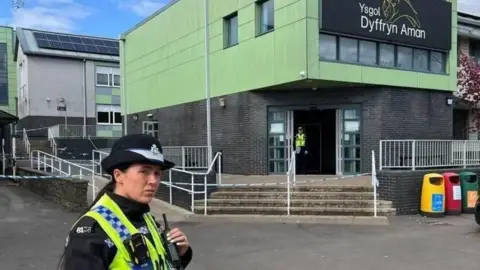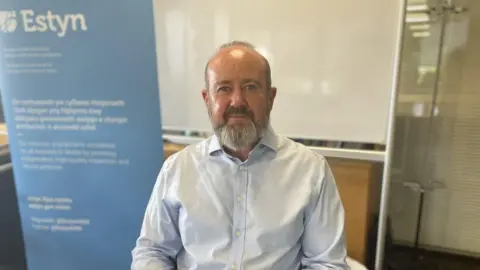Exclusion for knives 'too simple', says Estyn chief
 BBC
BBCUnderstanding why children bring knives into school is better than a blanket exclusion policy, the chief inspector of Welsh education inspectorate Estyn has said.
Owen Evans said the "easy answer" was to ban or exclude but he believed there needed to be more nuance.
He said there were multiple reasons why a child might bring a knife into school and a one-size-fits-all policy would not work.
But the NASUWT union's national officer for Wales, Neil Butler, described the suggestions as "most unhelpful" and said immediate exclusions needed to be a priority to keep everyone safe.
Mr Evans was talking after a 14-year-old girl was convicted of the attempted murder of three people during a school stabbing in Ammanford, Carmarthenshire.
"You may have a child that has every potential for redemption but they have fallen into bad practice and we cannot exclude those people from society," he told Walescast.
"I think you need to look at why. A lot of children who bring knives to school feel threatened themselves or they feel that other people are bringing knives to school.
"We need to tackle the root issues that sit behind that decision," he added.
Although knife attacks in Welsh schools are rare, Mr Evans said "we need to learn from it".
Bridgend council said it would launch a group to find out "what is going on" after police were called to Bryntirion Comprehensive last week after reports a knife had been found in a boy's bag, according to the Local Democracy Reporting Service.

Speaking to BBC Radio Wales Drive, Mr Butler agreed there needed to be an understanding as to why a child would bring a knife to school, but said the approach could not be nuanced.
He described Mr Evans' comments that exclusion shuts out pupils from society as "nonsense" and said exclusion was necessary to keep pupils and educators safe.
"If that child who has carried a knife into school is to stay there whilst the psychology professionals assess them, they continue to be a danger to other children in the school," he said.
He said exclusion would not mean the end of education for the child, but rather the child could seek out education in a "more suitable setting" other than a mainstream school.
"It must be clear that is the outcome, that is the consequence of taking part in that criminal, dangerous behaviour of that school," he said.
"It's as simple as that really," he said, adding "we have got to nip this in the bud, we must stop this now and that means clear exclusions for that kind of behaviour".
Estyn is currently preparing for the release of its annual report on the state of education and training across Wales.
Mr Evans said it could see behavioural issues were increasing in schools.
"It isn't across absolutely everything, but low-level disruption and also these more complex needs we are seeing more of.
"In primary schools we are seeing children who are not potty trained. Since the pandemic, we are seeing young people coming into schools who can't speak, who can't communicate.
"That is an issue," he added.
He said there needed to be more support for pupils, teachers and schools but accepted there were issues with capacity.
"Where you have strong leadership, clear and consistently applied policies to behaviour and when you have good support measures wrapped around child and the family you can make a real difference to behaviours in that setting.
"The support services around that school need to be in a position to pick that up and that at the moment is difficult.
"Demand after the pandemic has almost doubled," he said.
Wales' Education Secretary Lynne Neagle said a behavioural summit would be held next year to tackle the "complex" problems facing schools.
